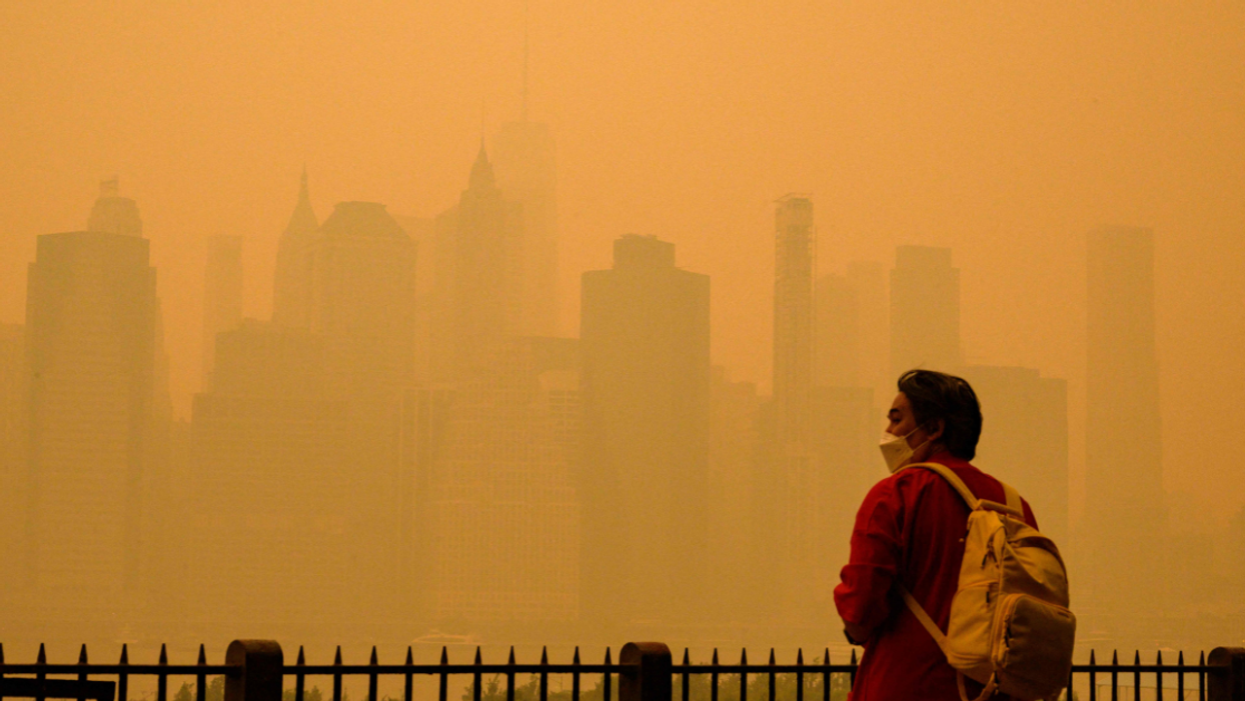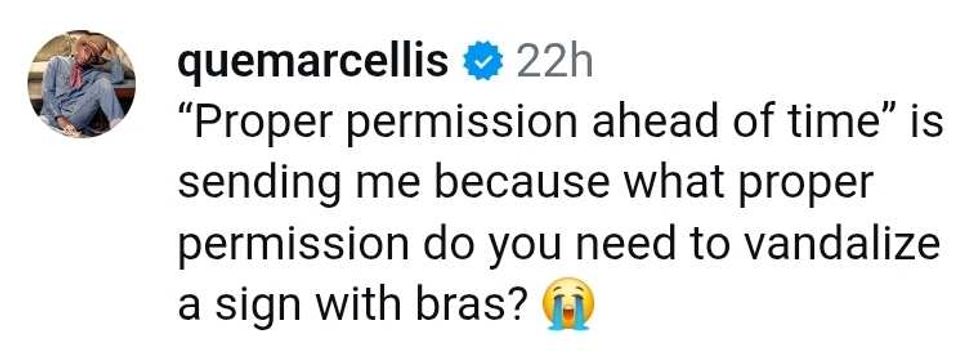Millions of North Americans are under air quality advisories as wildfires burning across Canada caused evacuations, disrupted air travel and lead to smoke-filled skies thousands of miles away.
The United States National Weather Service extended air quality alerts Thursday on the East Coast from central Maine to South Carolina and parts of the Midwest.
More than 400 Canadian wildfires were still burning az of Thursday. The province of Quebec alone has approximately 150 fires.
Cities such as New York and Philadelphia have dangerously low air quality as a result of the smoke.
People have been keeping a close eye on air quality updates.
\u201cLive view of Midtown Manhattan via @EarthCam as dense wildfire smoke settles in over NYC once again. An absolutely surreal scene.\u201d— New York Metro Weather (@New York Metro Weather) 1686154532
The city of New York had the worst air quality of any major city in the world Wednesday.
But large swaths of Eastern Canada and upstate New York were even worse.
\u201c@US_Stormwatch You are ignoring the purple (very unhealthy/borderline hazardous) zones in Canada because IQair doesn't report non-major cities.\n\nYet ~50% of Canada's population is impacted by this wildfire. NYC is one of the many cities impacted in the U.S. But we are nowhere near the worse.\u201d— Colin McCarthy (@Colin McCarthy) 1686097213
A tweet from Colin McCarthy—@US_Stormwatch—describing the effects of the air pollution really caught the internet's attention.
\u201cNew York City now has the worst air quality of any city on Earth. \n\nIf exposed to the current air quality in NYC for 24 hours, it would be equivalent to smoking about 6 cigarettes.\u201d— Colin McCarthy (@Colin McCarthy) 1686097213
Some were dubious of McCarthy's assertion, but the cigarette comparison didn't come out of nowhere.
Stanford Woods Institute for the Environment talked about Air Quality Index (AQI) and the comparison to cigarettes smoked in a 2020 article.
In their article, Dr. Kari Nadeau said:
"An AQI measurement of 20 is equivalent to smoking one cigarette a day."
"Communities exposed to wildfire smoke causing AQI of 150 for several days is equivalent to about seven cigarettes a day if someone were outside the whole time."
"Even if you’re indoors, you could be breathing in this poor air quality due to leakage."
As for the reason cigarettes are being used as a comparison, the article stated:
"Cigarette smoke is the best analogy researchers have right now but more research is being done to account for toxins in the air caused by wildfires that may go beyond the dangers of cigarettes."
Cigarettes and their dangers are also something that is ffairly familiar to the general population, likely leading to how quickly McCarthy's tweet spread.
Many people shared how the smoke was affecting their area.
\u201c@US_Stormwatch It smells like a camp fire or something burning here in PA. Instead of blue skies we have a peach colored haze.\u201d— Colin McCarthy (@Colin McCarthy) 1686074262
\u201c@US_Stormwatch 7:30pm Sun here in PA\u201d— Colin McCarthy (@Colin McCarthy) 1686074262
\u201c@US_Stormwatch Tell me about it. I feel like I'm trapped in a poorly processed Kodachrome slide where everything is tinted a light orange. And the smell.. burnt wood smell everywhere.\u201d— Colin McCarthy (@Colin McCarthy) 1686074262
\u201c@US_Stormwatch @MiaFarrow The peach colored sun early-mid morning was eery today.\u201d— Colin McCarthy (@Colin McCarthy) 1686074262
There were a lot of solidarity posts from people on the West Coast of North America—where wildfires and the resulting smoke have become almost commonplace.
\u201c@US_Stormwatch So sorry- as a Californian I understand the huge impact of smoke and smoky skies for days and weeks. #WildFire\u201d— Colin McCarthy (@Colin McCarthy) 1686074262
\u201c@US_Stormwatch We went through that a couple years ago here in Western Washington state, also due to smoke!\n\nIf you can afford it, I HIGHLY recommend getting a good HEPA air cleaning unit or 2 for your home: I'm regretting not having had gotten one then, they've reduced my allergies a ton!\u201d— Colin McCarthy (@Colin McCarthy) 1686074262
\u201c@US_Stormwatch It's the worst I've ever experienced, and I've lived through quite a few bad fire seasons back home in Western Canada. Never seen anything like this though since moving to Ontario.\u201d— Colin McCarthy (@Colin McCarthy) 1686074262
If you live in an area being affected by the smoke, the Environmental Protection Agency has some tips to help you deal with it:
- Keep your windows and doors closed as much as possible.
- Reduce the smoke that enters your home by setting your HVAC system to recirculate mode or close the outdoor fresh air intake damper.
- If you have a window unit air conditioner, also close the fresh air intake damper.
- Use an air purifier to help filter the smoke.
You can create a DIY air cleaner with a 20-inch box fan and a 20-inch furnace filter (you'll want one with a MERV rating of 11-14). You can find instructions on how to make that DIY filter below, provided by The Washington Department of Ecology and Confederated Tribes of the Colville Reservation.
If you have any N95 masks or respirators already because of the pandemic, they will significantly help filter out the smoke particles if you have to leave the house.
It is best to limit outdoor time as much as possible though.
You can find a full list of tips and recommendations for dealing with wildfire smoke on the EPA's website, HERE.








 @complexpop/Instagram
@complexpop/Instagram  @complexpop/Instagram
@complexpop/Instagram @complexpop/Instagram
@complexpop/Instagram @complexpop/Instagram
@complexpop/Instagram @complexpop/Instagram
@complexpop/Instagram @complexpop/Instagram
@complexpop/Instagram @complexpop/Instagram
@complexpop/Instagram r/Fauxmoi/Reddit
r/Fauxmoi/Reddit r/Fauxmoi/Reddit
r/Fauxmoi/Reddit r/Fauxmoi/Reddit
r/Fauxmoi/Reddit r/Fauxmoi/Reddit
r/Fauxmoi/Reddit r/Fauxmoi/Reddit
r/Fauxmoi/Reddit r/Fauxmoi/Reddit
r/Fauxmoi/Reddit r/Fauxmoi/Reddit
r/Fauxmoi/Reddit r/Fauxmoi/Reddit
r/Fauxmoi/Reddit r/Fauxmoi/Reddit
r/Fauxmoi/Reddit r/Fauxmoi/Reddit
r/Fauxmoi/Reddit r/Fauxmoi/Reddit
r/Fauxmoi/Reddit r/Fauxmoi/Reddit
r/Fauxmoi/Reddit r/Fauxmoi/Reddit
r/Fauxmoi/Reddit r/Fauxmoi/Reddit
r/Fauxmoi/Reddit r/Fauxmoi/Reddit
r/Fauxmoi/Reddit r/Fauxmoi/Reddit
r/Fauxmoi/Reddit r/Fauxmoi/Reddit
r/Fauxmoi/Reddit r/Fauxmoi/Reddit
r/Fauxmoi/Reddit r/Fauxmoi/Reddit
r/Fauxmoi/Reddit r/Fauxmoi/Reddit
r/Fauxmoi/Reddit r/Fauxmoi/Reddit
r/Fauxmoi/Reddit r/Fauxmoi/Reddit
r/Fauxmoi/Reddit r/Fauxmoi/Reddit
r/Fauxmoi/Reddit r/Fauxmoi/Reddit
r/Fauxmoi/Reddit r/Fauxmoi/Reddit
r/Fauxmoi/Reddit







